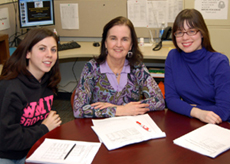Autism and Fragile X Syndrome
Autism Research
Parents answer questions about child behaviors such as social skills, communication, sensory-regulatory function, and attention, and the children who score differently are at risk for autism and intervention is recommended. A Spanish-language equivalent inventory has just been developed to capture that population as well. This inventory is being studied to see how Spanish-speaking parents respond, which may be different from English-language respondents. Families of children in which symptoms of concern have been verified are invited to participate in a 6-month early intervention study to receive home-based or community-based intervention services. Assessments are conducted with the families enrolled in the treatment study to determine developmental gains and diagnostic outcomes.
Crais is also involved in evaluating how screening for autism is currently conducted in health care settings. There are two components to the research: the first is focus groups aimed at finding out what takes place in 12-month well-child checkups related to screening for autism. The focus groups include pediatricians, family practice doctors, nurses, and family members. Varying types of practices are included, such as private pediatricians, family practices, and health departments. This information will help the researchers to revise the First Year Inventory to be more accepted by these ”frontline” types of practitioners who see children for their well-child checkups.
In addition to the focus groups, a survey will be conducted of pediatricians and family practice doctors to gather information about what they are doing regarding developmental screening, and, more specifically, autism screening (type of tools, information they need, etc.). As part of helping to inform these practitioners about issues surrounding autism, the project team also provides continuing education for physicians, nurses groups, and parents by request.
The project team includes Linda Watson, Betsy Crais, Grace Baranek, PhD, Professor, Division of Occupational Science, J. Steven Reznick, PhD, Professor, Psychology, and Lauren Turner Brown, PhD, Carolina Institute for Developmental Disabilities.
For more information on the First Year Inventory and other autism research projects, visit the Program for Early Autism Research, Leadership & Service (PEARLS) website: http://www.med.unc.edu/ahs/pearls

Courtesy of Linda Watson

Photo: Robert Ladd
Betsy Crais, PhD, Professor, Division of Speech and Hearing Sciences
”There is the whole issue of hope – that families, even in the worst of conditions, need hope to be able to move forward. We all – the village that surrounds these kids – need to keep that hope in mind.”

Photo: Jackson Roush
Linda Watson, EdD, Associate Professor, Division of Speech and Hearing Sciences, with Ashley Robinson (left) and Ashley Brasfield (right), speech-language pathology graduate students
”Autism can cause special needs and pain for the family, but there is a lot of potential for helping the situation. With children in early intervention it is important to take advantage of the strengths and compensate for weaknesses. Therapists can help with the family environment so that parents can have a satisfying relation with the child and assist in language development.”
-Linda Watson


 Aftermath of Stroke
Aftermath of Stroke





